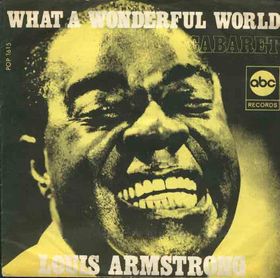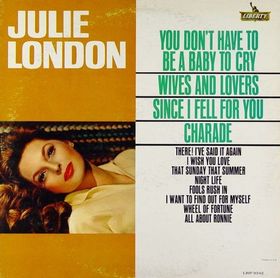
Liberty Records was a record label founded in the United States by chairman Simon Waronker in 1955 with Alvin Bennett as president and Theodore Keep as chief engineer. It was reactivated in 2001 in the United Kingdom and had two previous revivals.

"Over the Rainbow", also known as "Somewhere Over the Rainbow", is a ballad by Harold Arlen with lyrics by Yip Harburg. It was written for the 1939 film The Wizard of Oz, in which it was sung by actress Judy Garland in her starring role as Dorothy Gale. It won the Academy Award for Best Original Song and became Garland's signature song.

"What a Wonderful World" is a song written by Bob Thiele and George David Weiss. It was first recorded by Louis Armstrong and released in 1967 as a single. In April 1968, it topped the pop chart in the United Kingdom, but performed poorly in the United States because Larry Newton, the president of ABC Records, disliked the song and refused to promote it.

"Days of Wine and Roses" is a popular song, from the 1962 movie of the same name.
"So in Love" is a popular song, written by Cole Porter, from his musical Kiss Me, Kate, which was based on Shakespeare's The Taming of the Shrew. It was sung in the show by Patricia Morison, reprised by Alfred Drake, and further popularized by Patti Page in 1949.
"And That Reminds Me", also known as "My Heart Reminds Me", is a popular song.
"Ac-Cent-Tchu-Ate the Positive" is a popular song which was published in 1944. The music was written by Harold Arlen and the lyrics by Johnny Mercer. The song was nominated for the Academy Award for Best Original Song at the 18th Academy Awards in 1945 after being used in the film Here Come the Waves.
"Dream", sometimes referred to as "Dream (When You're Feeling Blue)", is a jazz and pop standard with words and music written by Johnny Mercer in 1944. He originally wrote it as a theme for his radio program. It has been and performed by many artists, with the most popular versions of this song recorded by The Pied Pipers, Frank Sinatra, and Roy Orbison.
"It Might as Well Be Spring" is a song from the 1945 film State Fair. which features the only original film score by the songwriting team of Richard Rodgers and Oscar Hammerstein II. "It Might as Well Be Spring" won the Academy Award for Best Original Song for that year.

"Can't Get Used to Losing You" is a song written by Jerome "Doc" Pomus and Mort Shuman, first made popular by Andy Williams in a 1963 record release, which was a number-two hit in both the US and the UK. Twenty years later, British band the Beat took a reggae re-arrangement to number three in the UK.
"That Lucky Old Sun (Just Rolls Around Heaven All Day)" is a 1949 popular song with music by Beasley Smith and words by Haven Gillespie.

Julie Is Her Name is the first LP album by Julie London, released by Liberty Records in December, 1955, under catalog numbers LRP-3006, in monaural form. It was subsequently reprocessed to produce a stereophonic album, and this stereophonic version was released on May 25, 1960 as catalog number LST-7037. The album featured Barney Kessel on guitar and Ray Leatherwood on bass.

The End of the World is an LP album by Julie London, released by Liberty Records under catalog number LRP-3300 as a monophonic recording and catalog number LST-7300 in stereo in June 1963. This was Julie London's second-to-last charting album, reaching number 127 on the Billboard charts.

Julie London is an LP album by Julie London, released by Liberty Records under catalog number LRP-3342 as a monophonic recording and catalog number LST-7342 in stereo in 1964. It was arranged by Ernie Freeman; with Dave Hassinger as the engineer.
"Let There Be Love" is a popular song with music by Lionel Rand and lyrics by Ian Grant, published in 1940.

"I'm Always Chasing Rainbows" is a popular Vaudeville song. The music is credited to Harry Carroll, but the melody is adapted from Fantaisie-Impromptu by Frédéric Chopin. The lyrics were written by Joseph McCarthy, and the song was published in 1917. It was introduced in the Broadway show Oh, Look! which opened in March 1918. The song was sung in the show by the Dolly Sisters. Judy Garland sang it in the 1941 film Ziegfeld Girl. It was subsequently sung by Jack Oakie in the 1944 film The Merry Monahans and was again featured in the 1945 film The Dolly Sisters, where it was sung by John Payne. It was also included for part of the run of the 1973 revival of Irene. Additionally, the pre-chorus would not have been included until later covers in the 1940s, where the song would gain it's iconic libretti.
"For You" is a song written by Joe Burke and Al Dubin in 1930. It was introduced in the Mack Sennett short Billboard Girl (1932) when it was sung by Bing Crosby. The best known version was from musician Rick Nelson in 1964, when it peaked at #6 on the Billboard Hot 100 and at #66 on the year end.
Sirach Charles, better known by his stage name Angel, is an English singer-songwriter, rapper and record producer from West London, England. His single "Go In, Go Hard", featuring vocals from English rapper Wretch 32, was released on 18 March 2012. The song reached number 41 on the UK Singles Chart. The following single, "Wonderful", performed better commercially, peaking at number nine on the UK Singles Chart and topping the UK R&B Chart.

The discography of American jazz singer Julie London consists of 29 studio albums, one live album, six compilation albums, two additional albums, and 29 singles. After a moderately successful film career, London signed a recording contract with the newly formed Liberty Records in 1955. Her debut single "Cry Me a River" reached number nine on the Billboard Hot 100 in 1955. In June 1957, it would also peak at number twenty-two on the UK Singles Chart. "Cry Me a River" became London's most successful and highest-selling single of her musical career. The single would sell three million copies in total. Her debut studio album Julie Is Her Name was issued in December 1955 and reached the second position on the Billboard 200 albums chart. London's next three studio releases, Lonely Girl (1956), Calendar Girl (1956), and About the Blues (1957), reached the top-twenty of the Billboard 200 survey as well.
"Soft Summer Breeze" is a song written and performed by Eddie Heywood. It reached No. 11 on the U.S. pop chart in 1956. The song was featured on his 1955 album, Eddie Heywood.









